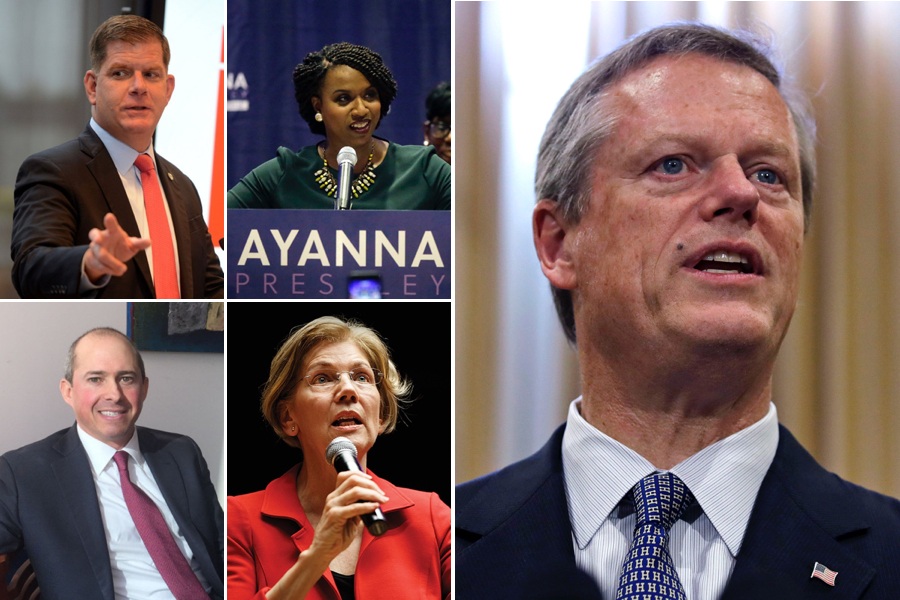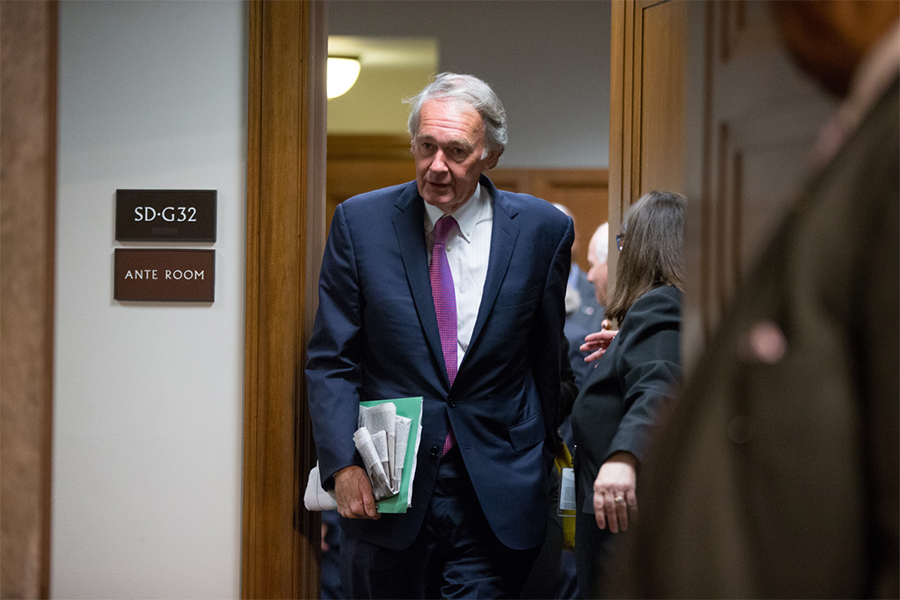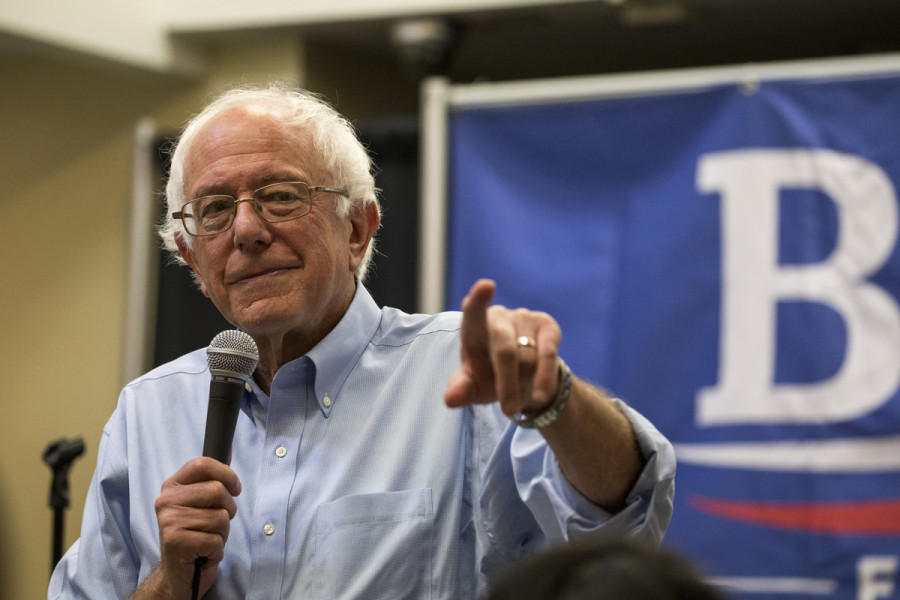Your Endorsement Guide for Question 1, on Massachusetts’ Nurse Staffing Levels
Where everyone stands on a plan that would shake up the state's hospitals.

Walsh photo via mayor’s office/Isabel Leon | Pressley photo via AP/Steven Senne | Baker photo via AP/Charles Krupa | Gonzalez photo via State House News Service | Elizabeth Warren photo via Getty Images
Still deciding how to vote on Question 1, the ballot measure that could reshape nurse staffing levels at hospitals in Massachusetts? Consult our handy endorsement guide for the latest on where top political voices stand on the controversial proposal before voters in November.
Top Democrats are lining up in favor of the plan, including Boston Mayor Marty Walsh and most of the state’s delegation to D.C. On the other side, Republican Gov. Charlie Baker, citing a report from the state’s Health Policy Commission that forecast a price tag between $676 million and $950 million for the change, is voting no. Influential business and medical groups, as well as all the state’s hospitals, are also allied against it.
Some other Democrats have declined to take a position, including Boston City Council President Andrea Campbell, who is staying neutral despite endorsing another pro-union position: a unanimous vote in favor of Boston’s striking hotel workers. House Speaker Robert DeLeo, who has voted for other nurse staffing limits in the past, says he has not yet made up his mind. The local Service Employees International Union is sitting this one out, too, despite a long list of labor group endorsements for the proposal (it’s sitting out the governor’s race as well).
Nurses themselves are split on the issue, according to polling out October 15 from MassINC and WBUR, which found that 48 percent of registered nurses support the question, 45 are opposed, and 7 percent are undecided. The latest WBUR poll of voters found support for it flagging: the people surveyed opposed it 58-31.
As you collect your thoughts before the election on November 6, here are a few opinions worth considering (we’ll update if things change):
Yes on 1
Boston Mayor Marty Walsh

Photo via mayor’s office/Isabel Leon
When I was a kid battling cancer, it was the nurses who stood beside me every day, fighting with me for my life. They are on the front lines protecting us when we are at our most vulnerable and they are supporting our families during the most difficult of times. Voting yes on Question 1 will allow nurses to better provide the invaluable care they are trained to give and ensure that both nurses and patients are protected in safe work environments (source)
Jay Gonzalez, Democratic gubernatorial candidate

Photo via State House News Service
We need to ensure that there isn’t cost cutting going on that is compromising the health and safety of patients. I do think this is a worthwhile issue. (source)
U.S. Sen. Elizabeth Warren
U.S. Sen. Ed Markey

Photo via AP PhotoAndrew Harnik
via Boston.com:
Sen. Ed Markey also says he “stand[s] with Massachusetts nurses” and will vote yes on Question 1. In a statement to Boston.com, Markey noted how nursing is consistently ranked among the most trusted professions and said that “we should trust them to know what they need to do their jobs safely and effectively.”
“Health care should be about the patients and those professionals that care for them,” he said. “It is important that we continually and cooperatively work to improve the quality of care provided to the patient and allow medical professionals, especially nurses, to do their jobs safely.”
Markey added that he has “confidence in our state leaders to work with our hospitals and other health care institutions to implement this policy fairly should it pass.” (source)
Congresswoman-elect Ayanna Pressley
I’ve got my #IVoted sticker + my @MassNurses #safepatientlimits button too. Let me see yours! @BostonElections #municipal #Prelim #bospoli pic.twitter.com/YVva79uRaJ
— Ayanna Pressley (@AyannaPressley) September 26, 2017
Vermont Sen. Bernie Sanders

Photo by Phil Roeder on Flickr/Creative Commons
Nurses are the backbone of our health care system. They are there with us when we are born, when we are sick and in the last years of our lives. They must be allowed to do the quality work that they have trained for. (source)
Congressman Jim McGovern
Our Revolution Massachusetts
Unite Here Local 26
“We will do everything in our power to ensure every patient in Massachusetts has a nurse” @BrianLang123 President of UNITE HERE Local 26. “That’s why Local 26 is voting #YESforPatientLimits in November and have decided to contribute $10,000 to the campaign.” @MassNurses #mapoli pic.twitter.com/ZWS8Vf0CtD
— UNITE HERE Local 26 (@UNITEHERE26) June 22, 2018
US. Reps Jim McGovern, Joe Kennedy III, Michael Capuano, Stephen Lynch, and candidate Lori Trahan are also listed as supporters of the new law on the Yes on 1 website. (Reps. William Keating and Richard Neal have not made their stances known, and we have asked them to clarify.)
Other supporters: Health Watch USA, Independence House, Inc., Mass-Care, Mass Health Professionals for Clean Energy, Massachusetts Nurses Association, Massachusetts Student Nurses Association, Show Me Your Stethoscope Foundation, Tufts Progressive Alliance, United Nurses & Allied Professionals, Western Mass. Medicare for all, Women’s Health Institute, The Massachusetts Democratic Party, Boston Teachers Union. (source)
No on 1
Gov. Charlie Baker
Based on the results of [the report from the state’s Health Policy Commission], I’m going to vote no on Question 1. I’m going to vote no because [the report] raised three issues that I was frankly not aware of. The first was that Massachusetts has a higher nurse to patient staffing ratio already than the state of California does. The second was that implementing that law would cost [up to $950 million], and the third was something I had heard from many of my colleagues in the community healthcare space: that many community hospitals and some nursing homes and even some rehab hospitals would have their operational future put in jeopardy if that law were to pass. Many of these community hospitals are critical care access providers in their districts.
The Boston Globe Editorial Board
From @GlobeOpinion | No on Question 1: Nursing staff ratio is wrong for Massachusetts. https://t.co/RzflGW9psS pic.twitter.com/CZ5m1lLeW6
— The Boston Globe (@BostonGlobe) October 22, 2018
Making medical staffing decisions at the ballot box is an inherently suspect idea. And hyperbolic ads aside, Question 1 would probably have costs and consequences for access to care: adding up to $1 billion a year in expenses, hurting community hospitals, reducing the number of psychiatric beds, and sidelining other caregivers. The question’s proponents need to demonstrate to voters why they should accept those risks.
They haven’t. In fact, there is no conclusive evidence that a nurse staffing law will lead to better care. And without clear evidence, a yes vote on Question 1 represents too much of a gamble for a health care system that is already considered one of the best in the world. (source)
The Boston Herald Editorial
Patient care is fluid. Care needs vary from patient to patient and from hospital to hospital. A one-size-fits-all approach in staffing ratios is impractical and would be detrimental to hospitals and patients alike. That is why we stand in opposition to ballot Question No. 1 (source)
Massachusetts Medical Society
The passage of Question 1 would drain nursing care from community care settings, including nursing homes, rehabilitation, home care, schools and #communityhealthcenters. @MAPatientSafety #NoOn1 https://t.co/XvxzHXZWsT pic.twitter.com/HH82Efpold
— Mass Medical Society (@MassMedical) October 1, 2018
Massachusetts’ world-class healthcare has everything to do with the team approach to patient care. … As a family physician, I know the value of team-based care that is focused on the needs of the patient. This law would fundamentally erode that team dynamic and replace it with a rigid system that relies on arbitrary numbers, which would put patient care at risk. – Alain Chaoui, M.D., president of the Massachusetts Medical Society (source)
Massachusetts Association of Colleges of Nursing
Representing 25 colleges of nursing around the Commonwealth, the Massachusetts Association of Colleges of Nursing is speaking out for the future of its graduates and the health and safety of the patients in their care: https://t.co/WwpFsXAx0C #mapoli pic.twitter.com/oBivdeLebH
— Protect Patient Safety (@MAPatientSafety) March 27, 2018
“Every College of Nursing prides itself on its ability to prepare nurses to be flexible, adapt to changing circumstances, and use their education and experience to make quick decisions for the care and safety of patients. … This ballot question takes flexibility and decision making out of the hands of skilled, educated nurses and makes it an administrative undertaking. We believe our nurses know what is best for patients. We are concerned about the effects of this proposal on patients’ health and wallets. – President Stephen J. Cavanagh, dean of nursing at UMass Amherst (source)
Greater Boston Chamber of Commerce
Rather than use a ballot question, I think there should be an element of trust in . . . both the doctors and the nurses, to make decisions about the care. – Jim Rooney, president (source)
Massachusetts Taxpayers Foundation
Health-care costs are already a burden for many families and employers across Massachusetts. … Massachusetts should use its health-care dollars to focus on more pressing priorities, like mental health care and addiction treatment, rather than this self-serving ballot initiative. -Eileen McAnneny, president (source)
Mayors Gail Infurna of Melrose, Paul Heroux of Attleboro, Robert Hedlund of Weymouth, Jon Mitchell of New Bedford, Donna Holaday of Newburyport and Mark Hawke of Gardner
To underscore the negative impact on our municipal operations, consider what would happen if an emergency department reaches its full legal allowance of patients for the number of nurses on duty. … Under the new law, a hospital would not be able to admit any more patients, forcing walks-ins and ambulances to search for another hospital that could be more than 10-20 miles away; wasting valuable time in life-and-death situations. For communities with municipal ambulance services, this will be an added financial and resource burden for our public safety officials. -August joint letter (source)
Every Massachusetts Hospital (according to the No on 1 campaign)
The mandated nurse staffing ratios included in Question 1 will undermine the professional judgement of our nurses and the trust our patients put in them to provide the quality of care that is expected from Emerson. – Joyce Welsh, vice president of patient care services and chief nursing officer at Emerson Hospital (source)
Others who aren’t supporting the ballot measure: American Nurses Association (Massachusetts), Emergency Nurses Association (Massachusetts), Massachusetts College of Emergency Physicians, Massachusetts League of Community Health Centers, American Academy of Pediatrics (Massachusetts), Massachusetts Home Care Alliance, Massachusetts Senior Care Association, Academy of Medical-Surgical Nurses (Greater Boston Chapter), Organization of Nurse Leaders. (source)
Want to learn more? We talked to a Harvard public health expert about what’s at stake.

